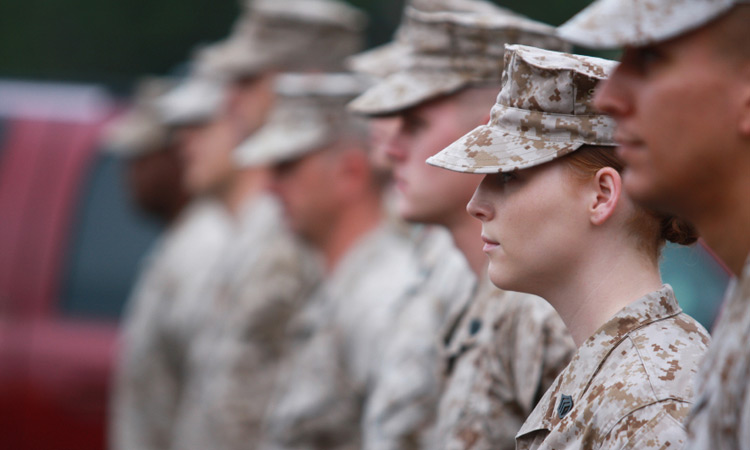 Hundreds of thousands of our veterans struggle with post-traumatic stress disorder (PTSD). Twenty-two veterans per day commit suicide. The first quarter of 2015 alone saw 99 suicides according to the Department of Defense (DoD) Quarterly Suicide Report. Clearly, finding inner peace for our veterans poses unique challenges after service.
Hundreds of thousands of our veterans struggle with post-traumatic stress disorder (PTSD). Twenty-two veterans per day commit suicide. The first quarter of 2015 alone saw 99 suicides according to the Department of Defense (DoD) Quarterly Suicide Report. Clearly, finding inner peace for our veterans poses unique challenges after service.
Army veteran, Monisha Rios, knows post-service difficulty first-hand. Discharged in 1998 Rios sought counseling for help with the traumatic effects of military sexual trauma, a category of assault that received 6,131 reports during the fiscal year 2014. Because seeking mental health support was “certain death” for a military career Rios waited until discharge to ask for help with pain, night terrors and other symptoms of PTSD. Sadly, Rios was denied support because she had not been penetrably raped; she was told she did not “deserve” to ask for help.
Several years later Rios reached out for support again, this time at a Women’s Clinic in college. She was ushered into a support group that included men (she didn’t attend), and then so overly medicated that she flunked a semester of school. Rios, however, isn’t a veteran to accept defeat. Overcoming homelessness and lack of mental health care she graduated college and went on to study for a Masters in Social Work (MSW) where, in 2010, she was introduced to the realization that her traumatic experiences did, indeed, qualify for benefits. With a supportive graduate faculty and staff Rios explains that the MSW program, “is where my voice grew strong.”
Today, Rios has become a major advocate of change through education. A prolific speaker and activist, she hopes to develop “experiential trauma-informed military cultural competency trainings for clinicians.” Having used her own life as a case study Rios now seeks to make a difference in the lives of others despite the poverty, poor health and corrupt governmental system for benefits that loom as the biggest challenges she sees facing today’s veterans.
Judy Davis, military spouse, author, military life and teen suicide prevention expert, concurs. She tells Rewire Me, “One of the biggest challenges facing veterans and their families is access to care, particularly continuity of care as they transition from active duty to the VA system. Where I see the biggest problems is with regard to mental/behavioral health. Approved medications differ between the DoD and the VA, access to care is problematic when many do not live near a military installation and the current system doesn’t have enough qualified providers to effectively treat veterans issues.”
Finding a way to create access to effective care for our veterans is one issue spurring the work of filmmakers Michael Dunker and David Lawson. They plan to donate 50% of the proceeds of their upcoming film, War at Home, to veterans’ services. For these two veterans War at Home is a personal mission.
Dunker and Lawson met in the 552nd Air Control Squad and served in 9/11, Operation Northern Walk, Operation Southern Walk, Operation Enduring Freedom and Operation Iraqi Freedom. These visionaries honorably exited the military, went to college together, moved to Los Angeles and have been making films for the past ten years. “We’re veterans, our families are veterans, our friends are veterans so this is an important mission for us,” they explain in a compelling Kickstarter video.
The story of a PTSD Marine who returns home from war only to find that his combat memories bring on flashbacks, nightmares and other symptoms that distance him from his family and friends, War at Home finds its uniqueness in specifically focusing not on war itself but on its effects afterward. Unlike Hurt Locker and American Sniper, “This film is about the life and death struggle after deployment. It’s about the friends and family trying to understand what is happening to our hero, while our hero is struggling to understand what’s happening to himself. These are topics rarely discussed in cinema, but are so needed for this country to recognize that PTSD is not going away. Though servicemen and women are taught everything you need is issued to you, dealing with PTSD is not one of them. This is where the discussion needs to start. This is what our film is about,” Dunker tells Rewire Me.
The point being made from Dunker to Rios to Davis is that we, as a nation, need to be proactive about creating an honorable healing culture for veterans. In the past ten years the military environment and VA have come a long way in clarifying and recognizing trauma and offering PTSD treatments. Still, it’s not enough. Each of us, military and civilian alike, share responsibility for speaking up, helping out and fueling the quest to, in the words of Davis, “Support, educate, inspire and motivate…One moment at a time.”
Click here to find out about Rose’s thoughts on wellbeing and health
Post Disclaimer
This content is for informational purposes only and does not constitute medical advice. Please consult a healthcare professional for any medical concerns.


